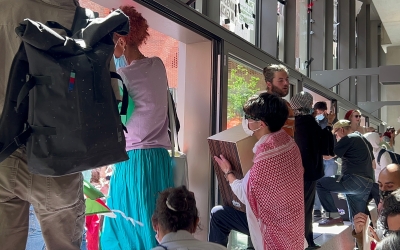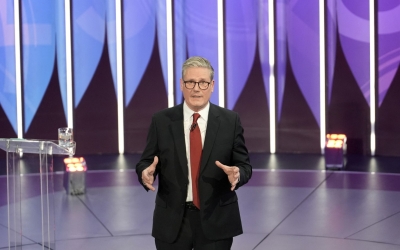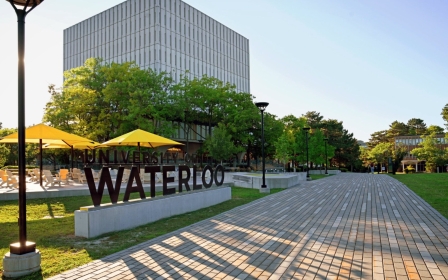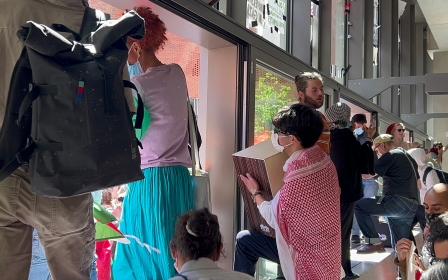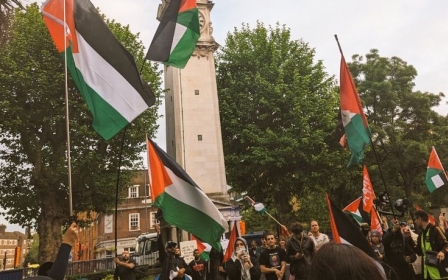Gaza encampments: As university terms end, UK students take on other forms of activism
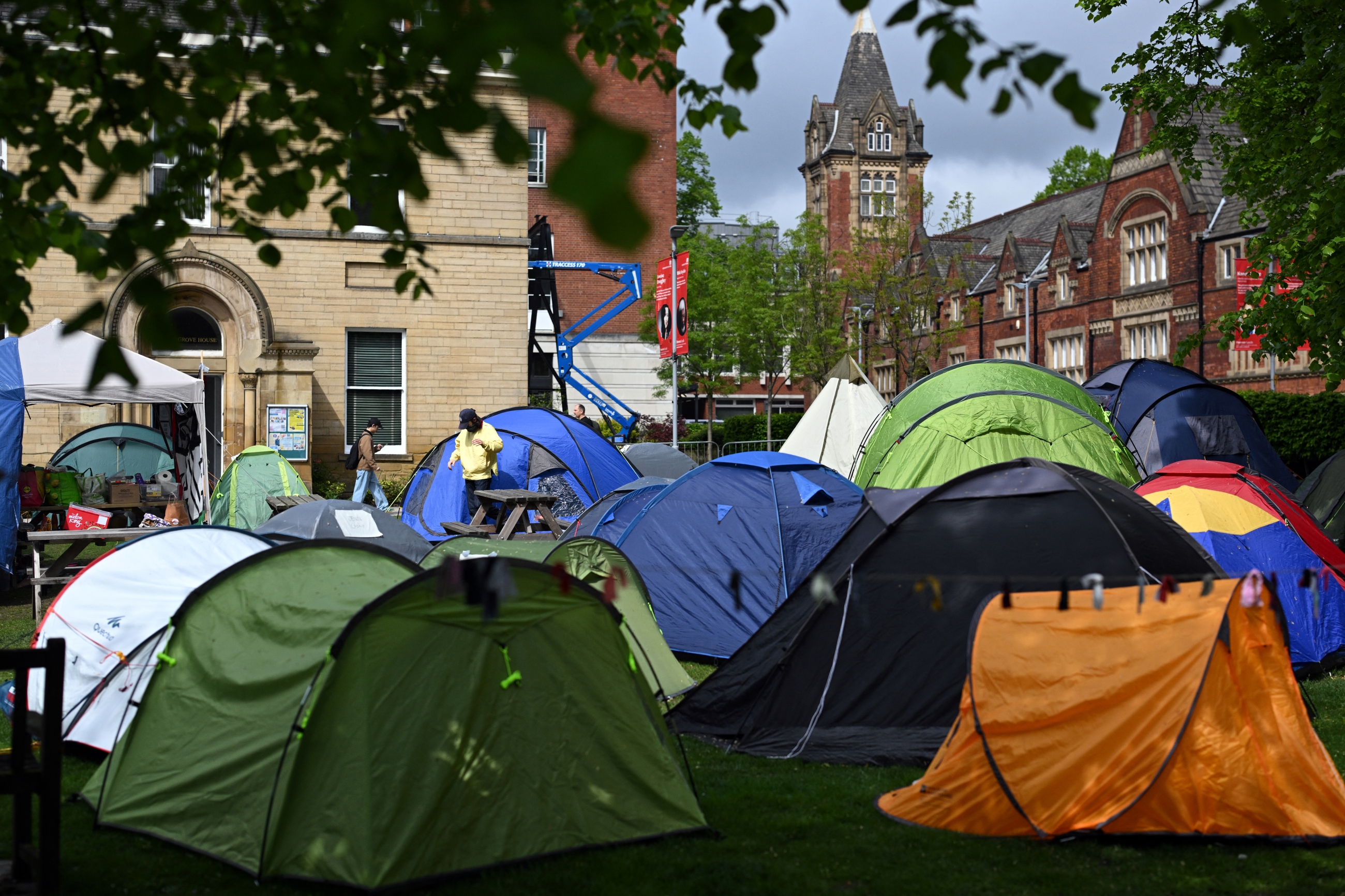
Fifteen of the 35 Gaza encampments at UK universities have concluded, while others plan to maintain their physical presence into summer.
Since early May, Gaza solidarity encampments have witnessed both successes, such as a university divesting from Barclays and a vice-chancellor's resignation, as well as crackdowns – including police arrests and court-ordered evictions.
Here is a roundup of what encampments have accomplished so far and what the end of term means for students’ pro-Palestine activism.
Demands met
At Swansea University, students packed up after a 28-day encampment and eight-day hunger strike.
New MEE newsletter: Jerusalem Dispatch
Sign up to get the latest insights and analysis on Israel-Palestine, alongside Turkey Unpacked and other MEE newsletters
The administration met several demands, most significantly divesting £5 million ($6.3m) from Barclays Bank.
Activist groups have long reported that Barclays has £2bn invested in companies involved in supplying arms to Israel, with an alleged £6.1bn increase last month.
A spokesperson for the Swansea Palestine Society said the end of the encampment does not signal the end of their activism.
“Ending the encampment does not mean we are satisfied with the university's decisions, and we will keep pressing for further changes,” the spokesperson told Middle East Eye.
“The encampment was not the beginning of our struggle, and it certainly will not be the end.”
'Ending the encampment does not mean we are satisfied with the university's decisions, and we will keep pressing for further changes'
- Swansea Palestine Society spokesperson
Meanwhile, University of the Arts London (UAL) students decided to end their six-week occupation of a college reception area on 26 June as part of a strategic shift.
A former UAL chancellor labelled the university “the world’s biggest factory for making trouble”, according to its website.
The encampment did indeed cause trouble. The UAL encampment claimed victory with the resignation of the UAL president and vice-chancellor, James Purnell, a former MP who previously chaired Labour Friends of Israel.
Following Purnell’s departure, UAL Students for Justice in Palestine found it “immediately clear… that channels of communication are more open than they have ever been”, a spokesperson told MEE.
In contrast to universities where sustained action was needed to elicit a response, Trinity College Dublin in Ireland swiftly decided to divest from Israeli firms after just five days of encampment.
Ireland recognised Palestine as a state last month.
Yet, some encampments disbanded without achieving substantial gains. Their administrations pledged dialogue, meetings and reviews but not concrete change.
The University of Manchester, for example, adhered to a principle of “not meeting protesters directly” but instead announced it would conduct dialogue through Students' Union officers.
Meanwhile, students at the University of Leeds plan to resume their activism in September, having secured several meetings with the university’s executives.
Removals
Several universities have recently dismantled encampments, often under court orders.
When tents first sprang up, Prime Minister Rishi Sunak urged university vice-chancellors to take action against the protests and address the “rising antisemitism” on campus.
Queen Mary University of London and Birmingham University were among the institutions that took students to court.
London School of Economics (LSE) ended negotiations and obtained an interim possession order to evict its students, forcing an end to their occupation of a building.
A spokesperson for LSE cited fire risks and the safety of the protesters.
Oxford University also appealed to public safety, citing lawn and irrigation system damage.
The administration fenced off the area of their initial encampment. A bulldozer then cleared the flowerbeds Oxford students built for their Gaza memorial garden.
Oxford also asked students to leave their second encampment site, threatening to seek a court order for possession if they do not comply.
Continued presence
At the time of writing, 20 encampments across the UK have maintained a physical presence on university campuses.
At Cambridge University's encampment, most summer residents are postgraduates, though local undergraduates and interns have also found ways to stay.
“Numbers may have reduced, though the spirit of resistance and solidarity with the Palestinian cause are stronger than ever,” a spokesperson of Cambridge for Palestine told MEE.
Students working remotely are focusing on planning and research.
'We will come back stronger than ever in the new academic year'
- Cambridge for Palestine spokesperson
“By turning our mobilisation effort into a re-organising and re-structuring one, we will come back stronger than ever in the new academic year,” the spokesperson said.
The summer encampment at Cambridge is “strategically oriented to build a stronger movement within the Cambridge local community” to foster a “city-wide movement”, they added.
Meanwhile, at Bristol University, the encampment plans to remain until their demands are met.
A spokesperson of Bristol Palestine Solidarity told MEE that numbers initially dipped after the term ended but have since been steadily increasing.
Events such as teach-outs, collective learnings and socials continue within the Bristol encampment.
Beyond demands
Not every action within the encampments has focused solely on seeking administrative change. Many events focused on building a sense of community.
Encampments have become sites where students, staff and town residents gather to create art, share meals and learn together.
The Oxford encampment organised a reading of Fred Moten and Stefano Harney’s influential essay The University and the Undercommons, which argued that higher education institutions are part of the structure that “turn the insurgents into state agents".
Instead, students turned to “Undercommons” as a space for alternative learning to educate themselves on liberation and justice.
A UAL encampment spokesperson told MEE they hosted teach-ins, screenings and workshops, saying: “As well as a hub for organising action, the Liberated Zone served as a space for political education.”
“As art students, [we] recognise the inherent political nature of creating art and reject the neoliberal neutrality that underpins our curriculum,” they added.
As youth-led organisations, the encampments have developed a strong presence on Instagram, where they mobilise supporters, share daily schedules and provide updates on Gaza. Supply drives often elicit generous donations from the community.
Protesters draw parallels with past student movements that were “on the right side of history”, including movements against the Vietnam War and South Africa’s Apartheid.
Many social media accounts also reference Macklemore’s pro-Palestine song Hind’s Hall.
Scrolling lines of lyrics frequent Instagram stories: “If students in tents posted on the lawn/ Occupyin' the quad is really against the law/ And a reason to call in the police and their squad/ Where does genocide land in your definition, huh?”
Middle East Eye delivers independent and unrivalled coverage and analysis of the Middle East, North Africa and beyond. To learn more about republishing this content and the associated fees, please fill out this form. More about MEE can be found here.


